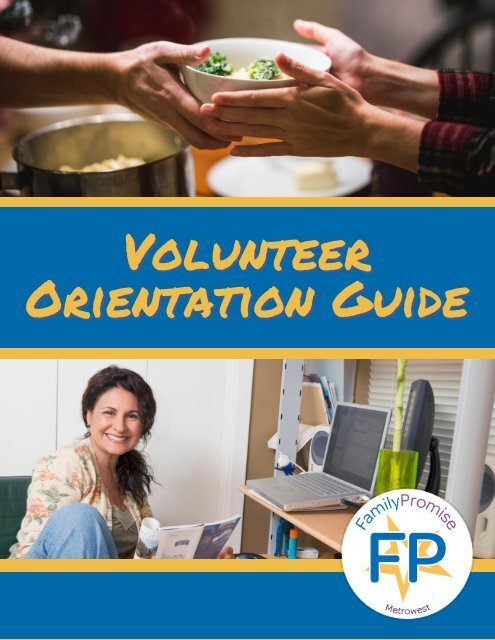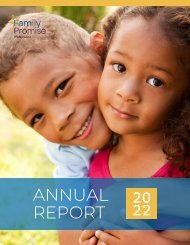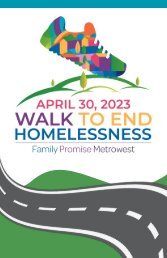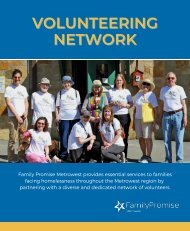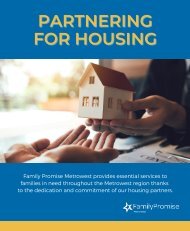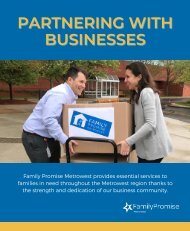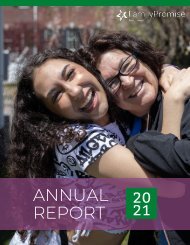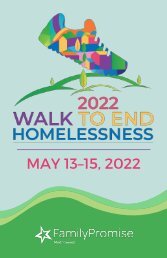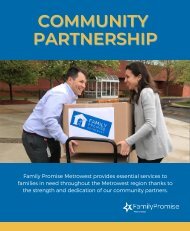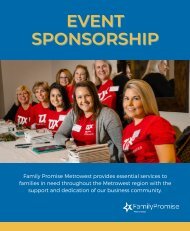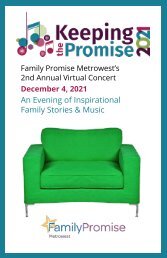FPM Volunteer Orientation_2023
Create successful ePaper yourself
Turn your PDF publications into a flip-book with our unique Google optimized e-Paper software.
<strong>Volunteer</strong><br />
<strong>Orientation</strong> Guide
Contents<br />
Introduction<br />
About Family Promise Metrowest<br />
Our Families<br />
Our Programs<br />
Leading with Empathy<br />
Practicing Non-Discrimination<br />
Respecting Boundaries<br />
Supporting Children in Shelter<br />
<strong>Volunteer</strong> Opportunities<br />
Youth <strong>Volunteer</strong>ing<br />
CERVIS<br />
Contact Info & Final Reminders<br />
Last Steps<br />
3<br />
5<br />
15<br />
19<br />
29<br />
37<br />
39<br />
47<br />
53<br />
65<br />
67<br />
70<br />
75<br />
2
Introduction<br />
Welcome to Family Promise Metrowest! <strong>Volunteer</strong>ing<br />
with <strong>FPM</strong> is a hands-on opportunity to welcome our<br />
families into a safe and caring community.<br />
This orientation guide is a self-paced introduction to<br />
our organization and the families we serve. It'll take<br />
about an hour to complete. In addition to reading<br />
the text, please be sure to watch the videos and<br />
follow links to our website for more information.<br />
3
Introduction<br />
To be qualified to volunteer directly with our<br />
families, you’ll need to:<br />
Complete this online orientation<br />
Take the assessment at the end of this book<br />
Register on CERVIS, our online volunteer<br />
platform (for volunteers ages 14+)<br />
Come into our office to fill out a background<br />
CORI check form (for weekend and overnight<br />
shifts only)<br />
5 4
About Family Promise Metrowest<br />
Our Mission<br />
<br />
To transform the lives of families with children<br />
that are facing homelessness by mobilizing a<br />
diverse community to provide shelter, education,<br />
and comprehensive support.<br />
5
About <strong>FPM</strong><br />
Our mission is supported by<br />
these core values:<br />
Partnership: We work together as a<br />
community to forge lasting solutions<br />
to the adversities our families face.<br />
Empathy: We approach our families<br />
with compassion and seek to<br />
understand and learn from each other.<br />
Equity: We believe in fairness and<br />
accept our responsibility to remedy<br />
injustices in our communities.<br />
Sustainability: We support our<br />
families in working toward a future of<br />
stability and independence.<br />
Stewardship: We strive to be good<br />
stewards of our resources in order to<br />
build a strong, healthy, and lasting<br />
organization.<br />
6
About <strong>FPM</strong><br />
<strong>FPM</strong> is a 501(c)3 nonprofit organization founded<br />
in 2008 by a network of multi-faith<br />
congregations that wanted to work together to<br />
address an alarming rise in family homelessness<br />
in the greater Boston region.<br />
We are an “Affiliate” of<br />
the national Family Promise<br />
organization founded by<br />
Karen Olson in Summit, NJ in 1988. There<br />
Family Promise<br />
National<br />
are nearly 200 Affiliates across the U.S., including<br />
one other in MA: Family Promise North Shore<br />
Boston in Beverly.<br />
7
About <strong>FPM</strong><br />
Our network of 50 congregations from across the<br />
Metrowest region provides essential support for our<br />
Shelter program, including preparing or purchasing<br />
food for families in shelter and fulfilling critical<br />
volunteer roles.<br />
To see the entire list of<br />
congregations:<br />
Congregational<br />
Network<br />
8
About <strong>FPM</strong><br />
<strong>FPM</strong> relies on a broad network of donors to support<br />
our programs. These include foundations, businesses,<br />
and local civic groups.<br />
Foundations Businesses Groups<br />
9
About <strong>FPM</strong><br />
We also receive support and supply donations from<br />
individuals, families, and local schools.<br />
Finally, we host two major fundraisers each year, a<br />
walkathon in the spring and a gala in the fall.<br />
To learn more about the<br />
different ways people give:<br />
Ways to Donate<br />
10
About <strong>FPM</strong><br />
The Day Center<br />
Our organization and shelter are located in our Day<br />
Center at 6 Mulligan Street in Natick, MA. We are<br />
open to visitors Monday to Friday from 9 am to 5 pm.<br />
Our main entrance faces South Ave. and requires the<br />
navigation of six steps. An accessible entrance with a<br />
ramp is available through our family entrance in back<br />
(please call our office to arrange this access).<br />
11
About <strong>FPM</strong><br />
Our building features:<br />
A large community space, where we hold meetings<br />
and workshops and where our families and<br />
volunteers dine in the evening<br />
A Bright Horizons "Bright Space" playroom on our<br />
basement level<br />
An outdoor play space with toys and bikes<br />
An enclosed patio with tables, umbrellas, and grill<br />
Family living space including private bedrooms,<br />
bathrooms, and a kitchen, used by volunteers only<br />
for food prep and clean-up<br />
Staff offices and a studio apartment for our live-in<br />
shelter manager
About <strong>FPM</strong><br />
Watch “Day Center <strong>Orientation</strong>,” a tour<br />
of our facility created by one of our high<br />
school volunteers.<br />
13
About <strong>FPM</strong><br />
For information about how we serve<br />
families, watch “A Home to Call My Own.”<br />
14
Our Families<br />
“Homeless”<br />
is not a type of person.<br />
It is simply a word that describes a person’s<br />
temporary housing status, which can be the result<br />
of many circumstances. We describe the families we<br />
support as “families experiencing homelessness” or<br />
“families facing homelessness.” We do not describe<br />
them as “homeless families.”<br />
15
Our Families<br />
The most common root causes<br />
of family homelessness in the<br />
metrowest Boston region are a<br />
lack of affordable housing<br />
combined with low earnings.<br />
Other circumstances that may result in a family<br />
losing their home include:<br />
Job loss or reduction in hours<br />
Medical bills<br />
Increase in childcare cost<br />
Families face many challenges<br />
when applying for state shelter.<br />
And due to overwhelming<br />
demand, it has become even<br />
harder to get help. We are an<br />
alternative when state shelter or<br />
government-supported housing<br />
is not an option.<br />
16
Our Families<br />
We serve families with children under age 18 that are:<br />
Low- and moderate-income<br />
Experiencing homelessness or at risk of<br />
homelessness and shelter entry<br />
Massachusetts residents, with priority given to<br />
families residing in the Metrowest region at the<br />
time of their housing crisis<br />
When entering our programs the vast majority of our<br />
parents are employed and earning $15-$20 per hour.<br />
However, a single parent earning this wage would<br />
have to work three to four full-time jobs to afford a<br />
modest two-bedroom apartment in the Boston area.<br />
This is simply impossible.<br />
17
Our Families<br />
These statistics will help<br />
you learn about the state<br />
of family homelessness in<br />
Massachusetts and the<br />
circumstances our families often face.<br />
UNDERSTANDING<br />
FAMILY<br />
HOMELESSNESS<br />
Watch “Who Are You Preparing<br />
to Welcome?”<br />
18
Our Programs<br />
We offer four programs that address a spectrum of<br />
housing and stabilization challenges for families in<br />
our region. These programs were developed by:<br />
Listening to families<br />
Understanding their individual needs<br />
Working with them to develop solutions<br />
We are proud of this unique, family-focused<br />
approach, which is flexible and responsive to the<br />
challenges that are constantly emerging for families.<br />
19
Our Programs<br />
Our programs rely on the<br />
following community resources and<br />
partnerships to support our families:<br />
<strong>Volunteer</strong>s from congregations<br />
and the wider community to<br />
provide meals, companionship,<br />
and professional support.<br />
Partnering service agencies, which<br />
offer additional resources, services,<br />
and referrals to families in all our<br />
programs.<br />
Generous donors, who provide<br />
food, clothing, gift cards, toiletries,<br />
holiday gifts, and monetary<br />
donations.<br />
20
Our Programs<br />
The Shelter Program<br />
Our shelter was launched by a network of multi-faith<br />
congregations that provided temporary overnight<br />
shelter by converting their classrooms into bedrooms<br />
on a rotating basis, while volunteers provided meals<br />
and overnight companionship.<br />
After converting our Day Center into a permanent<br />
shelter in 2022, our families now reside on-site<br />
throughout their participation in the program.<br />
<strong>Volunteer</strong>s from our network congregations and the<br />
greater community come into our center, the families'<br />
home, to provide meals and supportive<br />
companionship.<br />
For more information,<br />
please visit:<br />
SHELTER<br />
PROGRAM<br />
21
Our Programs<br />
The SAIL Program<br />
When families move out of shelter and back into<br />
apartments in the community, they enter our SAIL<br />
program (Sustaining Achievements for Independent<br />
Living). In this program, we help them reestablish<br />
their independence and lay the groundwork for longterm<br />
stability by providing:<br />
Financial support (“subsidies”) toward housing<br />
costs for one year<br />
Help in accessing furniture and household goods<br />
donations<br />
One year of ongoing family coaching to monitor<br />
their budget and ensure continual progress<br />
toward their goals<br />
For more information,<br />
please visit:<br />
SAIL<br />
PROGRAM<br />
22
Our Programs<br />
The LIFE Program<br />
The LIFE program (Local Initiative for Family<br />
Empowerment) is a homelessness prevention and<br />
shelter diversion program that supports families who<br />
are not yet homeless but at risk of eviction or shelter<br />
entry. This is our biggest program in terms of<br />
number of families served. LIFE families receive:<br />
Subsidies to pay for back rent, a security deposit,<br />
broker's fee, or other temporary housing costs<br />
Up to one year of family coaching<br />
The LIFE program enables families to avoid the<br />
trauma of losing their home and/or entering shelter.<br />
For more information,<br />
please visit:<br />
LIFE<br />
PROGRAM<br />
23
Our Programs<br />
The Steps to Success Program<br />
The Steps to Success program helps parents and<br />
teenage children in our housing programs find<br />
employment and educational opportunities that will<br />
increase their earning potential and help break the<br />
cycle of poverty. Through this program, families can<br />
access:<br />
Trained volunteers to provide professional support<br />
Referrals to community partners that offer<br />
educational or employment resources<br />
Subsidies for tuition, course fees, or supplies<br />
Subsidies for employment- or education-related<br />
childcare or transportation<br />
Scholarships to help pay for college expenses<br />
For more information,<br />
please visit:<br />
STEPS TO SUCCESS<br />
PROGRAM<br />
24
Our Programs<br />
Family coaching meetings give families an opportunity<br />
to meet weekly (shelter) or monthly (SAIL/LIFE) with<br />
program staff to discuss the particular challenges they<br />
are facing, set goals to tackle those obstacles, find the<br />
resources to meet their goals, and track their progress<br />
toward success. Goals are set in areas that are critical<br />
to their future sustainability including: Finance, Health,<br />
Employment, Education, Parenting, Transportation,<br />
and Housing.<br />
Family Coaching<br />
provides a supportive<br />
structure for families<br />
to create their own<br />
change. It is a critical<br />
aspect of our approach<br />
to helping families<br />
achieve long-term<br />
success.<br />
What Is Family Coaching?<br />
25
Our Programs<br />
The Impact of Our Programs<br />
Since our founding in 2008, we have provided shelter<br />
and support for over 400 families, including over 500<br />
adults and 700 children. In 2022, we served:<br />
73 FAMILIES<br />
88 122<br />
ADULTS<br />
CHILDREN<br />
This was a:<br />
INCREASE IN FAMILIES SERVED<br />
14% OVER 2021 NUMBERS.<br />
For an overview of the outcomes our families achieved<br />
over the last few years, please read our most recent<br />
Annual Reports.<br />
2019 ANNUAL<br />
REPORT<br />
2020 ANNUAL<br />
REPORT<br />
2021 ANNUAL<br />
REPORT<br />
26
Our Programs<br />
Although <strong>FPM</strong> offers the structure for success, it is<br />
our families themselves that create remarkable<br />
change. In 2022:<br />
100<br />
percent<br />
100<br />
percent<br />
100<br />
percent<br />
of Shelter families moved<br />
from shelter into<br />
affordable apartments<br />
of SAIL families established<br />
and maintained safe,<br />
stable housing<br />
of LIFE families avoided<br />
shelter entry and<br />
remained in their homes<br />
67%<br />
of Shelter families<br />
reduced their overall debt<br />
67%<br />
of SAIL families reached<br />
their debt reduction goal<br />
82%<br />
of LIFE families increased their<br />
income while in the program<br />
100%<br />
of Shelter families secured<br />
safe, affordable childcare<br />
100%<br />
of SAIL families were<br />
employed full-time<br />
75%<br />
of LIFE children with academic<br />
needs received support services<br />
27
Our Programs<br />
Watch “Nicole’s Story” to understand<br />
the impact of our programs on the<br />
families we serve.<br />
28
Leading with Empathy<br />
Try to imagine if...<br />
you had no place to go at the end<br />
of a long day.<br />
you had no place to invite<br />
friends to visit.<br />
you had no place to seek refuge<br />
during a storm, or a pandemic.<br />
you had nothing to feed<br />
your children for dinner.<br />
29
Leading with Empathy<br />
Although our families are motivated and resilient,<br />
many of them have difficult and complicated<br />
histories. Losing a home only amplifies these<br />
challenges and can make them feel:<br />
Overwhelmed<br />
Depressed<br />
Sad<br />
Anxious<br />
30
Leading with Empathy<br />
The stress of a housing crisis can also affect an<br />
individual’s behavior. On the outside it might<br />
look like:<br />
Detachment<br />
Exhaustion<br />
Indifference<br />
Ungratefulness<br />
31
Leading with Empathy<br />
In the following video, produced by Family<br />
Promise National, a shelter graduate describes<br />
the trauma families face when losing their home,<br />
their community, and their sense of belonging,<br />
and the uncertainty they face when entering a<br />
congregate setting.<br />
Watch “Setting the Table for Success”<br />
32
Leading with Empathy<br />
<strong>Volunteer</strong>s can positively impact someone who is<br />
experiencing homelessness. Compassion, patience,<br />
and empathy help our families understand that we<br />
are there to support them, not to judge. Supportive<br />
volunteer behavior includes:<br />
Respecting<br />
privacy and<br />
boundaries<br />
Responding<br />
without<br />
judgment<br />
Being present<br />
with guests<br />
Offering<br />
understanding<br />
and grace<br />
33
Leading with Empathy<br />
<strong>Volunteer</strong> behavior that does not support our<br />
families’ privacy and autonomy includes:<br />
Expressing<br />
criticism or<br />
judgment<br />
Asking<br />
personal<br />
questions<br />
Offering<br />
unsolicited<br />
advice<br />
Overruling<br />
a parenting<br />
decision<br />
34
Leading with Empathy<br />
Tips for Communicating<br />
with Empathy<br />
Always inquire with families how<br />
you can best support them. For example,<br />
"Would you like me to set the table?" or "Can I<br />
help you with the dishes?" empowers them to<br />
decide where they need help.<br />
Remember that empathic communication is not<br />
just the words you say but also your actions and<br />
even facial expressions. Make sure they are<br />
aligned with your good intentions.<br />
Be observant of families’ cues. A lack of eye<br />
contact, clenched jaw, or torso turned away can<br />
all signal a desire to disengage. Do not take this<br />
personally. Our families are under stress and<br />
sometimes need time away from others.<br />
Even with these stressors in mind, families and<br />
volunteers are expected to interact respectfully<br />
with one another. If you are ever uncomfortable<br />
with an individual’s behavior, please report your<br />
concerns to our Program Director (see page 70).<br />
35
Leading with Empathy<br />
<strong>Volunteer</strong>s’ attitudes and actions can have a<br />
lasting positive impact on our families.<br />
<strong>Volunteer</strong>s’ impact may be cumulative and not<br />
necessarily recognized by either party at the<br />
moment of interaction. Simple acts of kindness<br />
can create change in ways you may never fully<br />
witness.<br />
36
Practicing Non-Discrimination<br />
<strong>FPM</strong> celebrates differences in our community of<br />
families, staff, and volunteers. We strictly adhere to<br />
our Non-Discrimination Policy:<br />
<strong>FPM</strong> works to serve its clients respectfully and<br />
does not discriminate on grounds of race,<br />
religion, ethnicity, national origin, age, gender<br />
or gender identity, physical disabilities, sexual<br />
orientation, or economic status.<br />
Discrimination also applies to how we view and treat<br />
people who come from different housing situations.<br />
37
Practicing Non-Discrimination<br />
Think about the images you have of those who are<br />
facing homelessness. Do you envision:<br />
or ?<br />
or ?<br />
Your past exposure to people experiencing<br />
homelessness may have shaped your assumptions<br />
about why a family might find itself without a home.<br />
As you meet our resilient, hard-working families,<br />
remember they are just like all of us, and simply need<br />
the resources, support, and time to achieve their goals.<br />
38
Respecting Boundaries<br />
Establishing respectful and appropriate boundaries<br />
between volunteers and families creates a beneficial<br />
environment for everyone. Our families appreciate<br />
volunteers that:<br />
Greet them with kindness<br />
Introduce themselves<br />
Learn their names<br />
Are good listeners<br />
Are gracious if they don’t want to talk<br />
Treat them as equals<br />
To guide your respectful interactions<br />
with our families, please remember<br />
the following guidelines...<br />
39
Respecting Boundaries<br />
Avoid probing into families’ personal lives.<br />
Being asked to share personal information can be an<br />
emotional burden. Parents may feel embarrassed,<br />
tired of talking about what brought them to <strong>FPM</strong>, or<br />
may simply wish to keep their personal life private.<br />
Their need for privacy must always be respected. If a<br />
family seems open to conversation, choose engaging<br />
and non-intrusive questions:<br />
How was<br />
your day?<br />
Did you watch<br />
the Pats game<br />
last night?<br />
What activities<br />
do your kids<br />
enjoy?<br />
Do you have<br />
any hobbies?<br />
40
Respecting Boundaries<br />
Help us protect our families’ privacy.<br />
If a family member chooses to disclose a part of<br />
their experience to you, do not share this<br />
information with others unless there is a safety<br />
concern. In this case, please report the information<br />
to our Program Director (see page 70).<br />
All information obtained from or concerning<br />
families is privileged communication. It’s natural to<br />
want to discuss your volunteering experience with<br />
your family and friends, but never share names or<br />
other details that might identify a family member.<br />
Their right to confidentiality and privacy must be<br />
respected at all times.<br />
41
Respecting Boundaries<br />
Respect our families personal space.<br />
Remember that the Day Center is our families'<br />
home during their stay in our shelter program.<br />
Please treat the family area of the Day Center the<br />
same way you would treat anyone else's private<br />
home. This includes all space beyond the swinging<br />
door off the community meeting room. Do not<br />
enter that space without first knocking and being<br />
invited to enter. Families might be bathing<br />
children, wrapping up some work, or simply wish<br />
to have quiet time alone. They need protected<br />
personal space just like all of us.<br />
42
Respecting Boundaries<br />
Don’t take pictures of our families.<br />
A family’s struggle with housing insecurity and<br />
their journey back to stability is their own story to<br />
tell. To respect their privacy, do not take<br />
photographs or videos during any of your<br />
volunteering shifts when families are present.<br />
Likewise, do not share any information about our<br />
families on your social media accounts. We ask<br />
that you refrain from using your cell phone in our<br />
families’ presence to avoid any concern that you<br />
might be taking pictures or videos.<br />
43
Respecting Boundaries<br />
Don’t give gifts directly to families.<br />
If a family tells you they need something beyond<br />
what is typically provided by the program (such as<br />
food, bedding, or first aid supplies), please inform<br />
the Program Director (see page 70). If you’d like to<br />
make a donation to help the family, you can<br />
discuss it directly with the Director.<br />
The Program Director will review the situation and<br />
make sure the family’s needs are being met.<br />
44
Respecting Boundaries<br />
Respect the diversity of our community.<br />
Respecting a broad diversity in thought and faith is<br />
central to our mission. Although many individuals<br />
volunteer as an expression of their deeply held<br />
values, please do not discuss or advocate for your<br />
personal beliefs, religion, or political affiliation with<br />
our families.<br />
45
Respecting Boundaries<br />
Respecting these guidelines will create a safe and<br />
comfortable space for everyone, and will create<br />
healthy and positive connections between our<br />
families and our volunteers.<br />
Watch “Boundaries Build<br />
Beautiful Experiences”<br />
46
Supporting Children in Shelter<br />
A few key statistics about children and homelessness:<br />
The average age of a child<br />
in our shelter is only 6<br />
years old.<br />
In the 2020-2021 school<br />
year, 19,954 students<br />
experienced homelessness<br />
in Massachusetts.*<br />
Children without homes are<br />
more likely to suffer from<br />
chronic illness and hunger.**<br />
*Massachusetts Coalition for the Homeless **American Academy of Pediatrics, 2013.<br />
47
Supporting Children in Shelter<br />
Entering shelter is often<br />
traumatic for children.<br />
Although many younger<br />
children don’t comprehend<br />
that they are in a shelter<br />
and happily engage with<br />
our friendly volunteers...<br />
...being in shelter is<br />
often emotionally<br />
difficult for middle and<br />
high schoolers.<br />
Children this age often<br />
do not want to interact<br />
with volunteers and<br />
will retreat to their<br />
rooms. Respect their<br />
need for privacy.<br />
48
Supporting Children in Shelter<br />
To make sure that we are sensitive to the special<br />
needs of the children in our programs, here are<br />
some helpful pointers:<br />
We are all strangers to the<br />
children at first.<br />
When meeting a child in our shelter:<br />
Introduce yourself to the parent first<br />
Let the parent direct their child how to<br />
greet/interact with you<br />
Follow a child’s lead for whether they’d like<br />
to interact<br />
Children need time to adapt to the <strong>FPM</strong><br />
environment and it is the parents’ job to guide<br />
this process.<br />
49
Supporting Children in Shelter<br />
Let parents do the parenting.<br />
This creates consistency for children while<br />
respecting and empowering parents. Unless a<br />
child is in immediate danger of harm, it is not<br />
appropriate for a volunteer to:<br />
Contradict a parent’s instructions to their<br />
children<br />
Correct a child’s behavior<br />
Punish a child in any manner<br />
Offer parenting “advice” to parents<br />
50
Supporting Children in Shelter<br />
Parenting styles are different<br />
and subjective.<br />
<strong>FPM</strong> families come from a wide variety of<br />
experiential and cultural backgrounds. What may<br />
seem overly restrictive or permissive to you may<br />
be perfectly aligned with a parent’s own<br />
upbringing, beliefs, or culture.<br />
Resist the temptation to evaluate their<br />
parenting style through the lens of your own<br />
life experience.<br />
51
Supporting Children in Shelter<br />
Parents are responsible for<br />
their children.<br />
<strong>Volunteer</strong>s can never be alone with children of<br />
any age. All children under the age of 6 must be<br />
supervised at all times by their parents. Older<br />
children do not have to be in their parent’s sight at<br />
all times, but it is their parents’ job to supervise<br />
them.<br />
<strong>FPM</strong> is a “mandated reporter” of<br />
suspected incidents of abuse or<br />
neglect. If a volunteer suspects a<br />
child is being mistreated or<br />
neglected, they should<br />
immediately communicate their<br />
concerns to our Program Director<br />
(see page 70).<br />
52
<strong>Volunteer</strong> Opportunities<br />
The success of our families and our organization<br />
hinges on the commitment and passion of all our<br />
volunteers. We can't do what we do without you.<br />
Being an <strong>FPM</strong> volunteer requires balancing multiple<br />
skills. Our most effective volunteers are:<br />
Responsible &<br />
Flexible<br />
Compassionate &<br />
Empathetic<br />
53
<strong>Volunteer</strong> Opportunities<br />
Although you may anticipate that your volunteer<br />
shift will go a certain way, the reality may be<br />
different because of all the variables involved.<br />
Sometimes children don’t want to play or a family<br />
has to work late and misses dinner or a tutoring<br />
session with you.<br />
Please be flexible with your expectations and<br />
remember that simply signing up, showing up,<br />
and being present for our families (or staff) if they<br />
need you is the greatest gift you can offer.<br />
54
<strong>Volunteer</strong> Opportunities<br />
There are many ways to share your time and skills<br />
with our families and staff. Some examples include:<br />
<br />
Shelter Support<br />
Weekend <strong>Volunteer</strong>s<br />
Cooking Meals<br />
Academic Tutoring<br />
Sharing Professional Skills<br />
Moving Support<br />
Event Support<br />
Donation Drives<br />
For information about current opportunities:<br />
WAYS TO<br />
VOLUNTEER<br />
Any questions about volunteering can be directed to<br />
our <strong>Volunteer</strong> Coordinator (see page 70).<br />
55
<strong>Volunteer</strong> Opportunities<br />
Shelter Support<br />
<strong>Volunteer</strong>s are needed for various roles in the<br />
Shelter program, including room preparation,<br />
childcare, and grocery shopping. <strong>Volunteer</strong>s are<br />
also welcome to bring games and crafts to share<br />
with the children in shelter.<br />
In the evening, most families return to their private<br />
space by 8:00pm so the kids can get ready for bed.<br />
<strong>Volunteer</strong> presence during this quiet time before<br />
the Shelter Manager relieves you at 8:30pm<br />
provides reassurance for both our families and staff.<br />
56
<strong>Volunteer</strong> Opportunities<br />
Weekend <strong>Volunteer</strong>s<br />
Weekend volunteers provide essential shelter<br />
coverage while our staff is off-duty, ensuring our<br />
building is safe and families have someone to turn to<br />
if needs arise. Since families are typically out and<br />
about on weekends, this role can be very quiet.<br />
However, it's perfect for student volunteers over 18<br />
(who can take advantage of the time to study) or<br />
others who don't mind a bit of downtime to do a<br />
crossword, knit, or write a best-selling novel.<br />
Weekend volunteers receive a door code to access<br />
the building in the week prior to their shift.<br />
57
<strong>Volunteer</strong> Opportunities<br />
Cooking Meals<br />
Many individuals and families love preparing dinners<br />
for our families in shelter. It's also a popular activity<br />
for school and business groups—a great way to have<br />
fun while helping others. Meals are delivered by 5pm<br />
and should be labeled with ingredients and serving<br />
instructions. An outdoor grill is also available for use<br />
when weather permits.<br />
58
<strong>Volunteer</strong> Opportunities<br />
Academic Tutoring<br />
Trained volunteers provide tutoring to families by<br />
offering support in completing school assignments<br />
or in building academic skills. Tutoring can take<br />
place online or in-person.<br />
59
<strong>Volunteer</strong> Opportunities<br />
Sharing Professional Skills<br />
We sponsor in-house classes for our families to<br />
build knowledge in financial literacy, good tenancy,<br />
and other essential life skills. We are always<br />
seeking volunteers with experience in these areas<br />
to help teach these classes. Your professional<br />
experience can add great value to course content<br />
and discussions.<br />
60
<strong>Volunteer</strong> Opportunities<br />
Moving Support<br />
As families move into new homes, we often need<br />
volunteers to collect furnishings and other needed<br />
supplies to prepare for a new home, and others to<br />
help move furniture and belongings on moving day.<br />
61
<strong>Volunteer</strong> Opportunities<br />
Event Support<br />
We sponsor two major and several smaller events a<br />
year and are often looking for volunteers to help us<br />
on the day of the event with set-up, ticket sales,<br />
and other roles. This is a great way to support our<br />
organization while having fun too!<br />
62
<strong>Volunteer</strong> Opportunities<br />
Donation Drives<br />
We have drives throughout the year to provide the<br />
basic essentials of food, toiletries, clothing, and<br />
school supplies to enable families to save the<br />
majority of their income for future housing.<br />
<strong>Volunteer</strong>s can help coordinate drives at our office<br />
or in their own workplace or school.<br />
63
<strong>Volunteer</strong> Opportunities<br />
The Impact of <strong>Volunteer</strong>s<br />
Hear how a thoughtful gift from a volunteer<br />
helped a family feel at home (90 sec).<br />
A father speaks to the importance of volunteers<br />
in creating a home at Family Promise (40 sec).<br />
64
Youth <strong>Volunteer</strong>ing<br />
If you are 14 or older, after you complete this<br />
orientation and the live training, you are eligible to<br />
volunteer independently with our families.<br />
<strong>Volunteer</strong>s who are under age 14 are invited to<br />
volunteer with their parent(s) or a guardian over the<br />
age of 18. We ask adults who would like to<br />
volunteer with their children to ensure that these<br />
younger volunteers are prepared to interact with<br />
our families with empathy and respect.<br />
To do this, feel free to review this online training<br />
book with children ages 10-13, using your<br />
knowledge of your<br />
child to select only<br />
the sections that you<br />
feel they are ready<br />
to learn about.<br />
65
Youth <strong>Volunteer</strong>ing<br />
To support your conversations with younger children<br />
(under age 10), here are a few additional resources:<br />
<br />
Story Videos for Young Children<br />
A Place to Stay: A Shelter Story, by Erin Gunti<br />
The Lady in the Box, by Ann McGovern<br />
Fly Away Home, by Eve Bunting<br />
A Rainbow Kind of Day, by Sesame Street<br />
Reading List for Older Children<br />
Just Under the Clouds, by Melissa Sarno<br />
Stay, by Bobbie Pyron<br />
Rich: A Dyamonde Daniel Book, by Nicki Grimes<br />
Videos about Homelessness<br />
Parents and Kids Talk About Homelessness, by National Alliance to<br />
End Homelessness<br />
Videos on the Family Promise Metrowest YouTube channel<br />
Sesame Street in Communities website<br />
has a section focused on family<br />
homelessness that offers numerous ageappropriate<br />
resources for parents and<br />
guardians to discuss this challenge with<br />
their younger children. They recently<br />
introduced a new muppet character, Lily,<br />
whose family has lost their home.<br />
66<br />
5
CERVIS<br />
CERVIS is our online volunteer engagement platform.<br />
New volunteers register for an account and then log<br />
in to register for available volunteer opportunities.<br />
Each week a different organization in our network<br />
serves as the shelter "host" and is responsible for<br />
filling available volunteering roles. Although many of<br />
the organization’s members sign up, these roles are<br />
open to anyone from our broader community.<br />
Once you register for a shelter role, you'll receive a<br />
confirmation email that includes the name and<br />
contact info for your Event Leader. Closer to your<br />
volunteer date, you may also receive an email from<br />
the Event Leader with more details about your role.<br />
67
CERVIS<br />
<strong>FPM</strong> also reaches out to CERVIS registrants<br />
periodically with opportunities that match your<br />
stated interests in your profile. <strong>Volunteer</strong>s are asked<br />
to keep their CERVIS profile up to date with<br />
accurate information, including contact information,<br />
interests, and professional affiliations. The more<br />
information you provide on your profile, the better<br />
we can match you to volunteer needs.<br />
The link to our CERVIS portal is found at the top of<br />
our homepage.<br />
68
CERVIS<br />
Late Arrivals & Cancellations<br />
Late Arrival:<br />
If you are running late for your shift, please contact<br />
that week’s Event Leader listed in the confirmation<br />
email you received from CERVIS upon registering.<br />
Cancellations:<br />
If you are cancelling at least 48 hours in advance,<br />
please log into CERVIS and unregister yourself from<br />
the opportunity. If you are cancelling last-minute,<br />
please call that week’s Event Leader directly.<br />
Any further questions about<br />
volunteering can be<br />
directed to our <strong>Volunteer</strong><br />
Coordinator (see page 70).<br />
CERVIS<br />
69
Contact Info & Final Reminders<br />
6 Mulligan Street, Natick, MA 01760<br />
www.familypromisemetrowest.org<br />
volunteer@familypromisemetrowest.org<br />
Main line: 508-318-4820<br />
On-call line: 508-319-9484<br />
Paula Brown, <strong>Volunteer</strong> Coordinator<br />
paula@familypromisemetrowest.org<br />
508-231-4159<br />
Stephanie Di Dio, Program Director<br />
stephanie@familypromisemetrowest.org<br />
508-231-4155<br />
Danielle Conti, Executive Director<br />
danielle@familypromisemetrowest.org<br />
508-231-4053<br />
Event Leader (changes weekly)<br />
Contact info is in CERVIS or your<br />
confirmation email<br />
70
Contact Info & Final Reminders<br />
On-Call Line<br />
If you need to reach a staff<br />
member during your volunteer<br />
shift with an urgent issue or to<br />
report an emergency, you may<br />
call our on-call staff member at<br />
508-319-9484. Urgent issues<br />
include:<br />
a medical emergency (call 911 first)<br />
a family member who fails to return to the shelter<br />
a major facility issue such as a leak or fire<br />
All non-emergency issues should be reported to our<br />
<strong>Volunteer</strong> Coordinator via email or via phone the next<br />
business day.<br />
If a non-life-threatening medical issue arises, help<br />
the family contact Uber or a taxi service if they don't<br />
have a car. Never drive guests in your car.<br />
71
Contact Info & Final Reminders<br />
Our Online Communities<br />
Facebook<br />
Instagram<br />
Twitter<br />
YouTube<br />
72
Contact Info & Final Reminders<br />
Helpful Reminders<br />
It’s normal to feel a bit anxious the first time<br />
you volunteer. These feelings will pass<br />
quickly.<br />
Please read all emails carefully to ensure<br />
you are on-time and prepared.<br />
If an unexpected situation arises, use your<br />
best judgment. Our primary goal is safety<br />
for all.<br />
The <strong>Volunteer</strong> Notebook contains detailed<br />
information about each role and reminders<br />
about our policies and procedures. Please<br />
bookmark the document.<br />
Do not hesitate to reach out to our office with any<br />
questions prior to your shift.<br />
73
Contact Info & Final Reminders<br />
COVID Guidelines<br />
Vaccinations: Our staff and resident adults have all<br />
received a primary COVID vaccine series, at a<br />
minimum. Children in shelter are encouraged but not<br />
required to be vaccinated.<br />
Masking: Masks are not required in our facility, unless<br />
you are unvaccinated or recently exposed to COVID.<br />
However, we uphold a supportive mask culture,<br />
where anyone with concerns about exposure is<br />
encouraged to wear a mask while in our facility and to<br />
maintain social distancing from others while on site.<br />
Illness: We will communicate any positive COVID<br />
cases among our staff or resident families to<br />
volunteers from the prior week and volunteers that<br />
are signed up for shifts in the two upcoming weeks. If<br />
you are diagnosed with or showing signs of ANY<br />
contagious illness, please cancel your shift.<br />
For volunteers concerned about COVID exposure, we<br />
offer contact-free volunteering opportunities and<br />
label them as such in our CERVIS volunteer portal.<br />
74
Last Steps<br />
Please complete this<br />
orientation by taking our<br />
brief assessment. This<br />
assessment is not a test, but<br />
rather a continuation of your<br />
learning. You will not be<br />
“graded.”<br />
ASSESSMENT<br />
Create a volunteer profile on<br />
CERVIS.<br />
CERVIS<br />
Sign up for our e-mailing list<br />
on our website.<br />
EMAIL LIST<br />
Congratulations! You're Done!
THANK YOU<br />
for supporting our families. See you soon!


